 In Florida, rusty screws are a common problem with screened enclosures, patios and porches. There are several factors that cause rust and resultant screen door repair – exposure to rain, sun, and humidity are the most typical ones. The screw heads frequently ‘pop’ off, weakening and compromising the structure.
In Florida, rusty screws are a common problem with screened enclosures, patios and porches. There are several factors that cause rust and resultant screen door repair – exposure to rain, sun, and humidity are the most typical ones. The screw heads frequently ‘pop’ off, weakening and compromising the structure.
Another major problem is chlorine. Many people wash their patios or decks with chlorine, which causes screws to rust a lot faster. To slow down the process, ensure that the chlorine is thoroughly rinsed off any metal areas and screws after washing.
When incompatible metals touch each other, rust can also occur. For example, the screws and frame are made of different types of metal. In this case, screen door repair would involve replacing the existing screws with ones that are resistant to rust.
Below are the various metals that are typically used to manufacture screws for metal-framed screens for patios, porches or pools:
- Galvanized metal
- Zinc
- Stainless steel
- Various coatings
Note: Stainless steel is a mixture of various metals, including includes nickel, which is a rust-resistant material. However, nickel isn’t as strong as steel, so it can’t be used on its own to make screws. And, by the way, contrary to what you may have heard, stainless steel screws will eventually rust over time.






